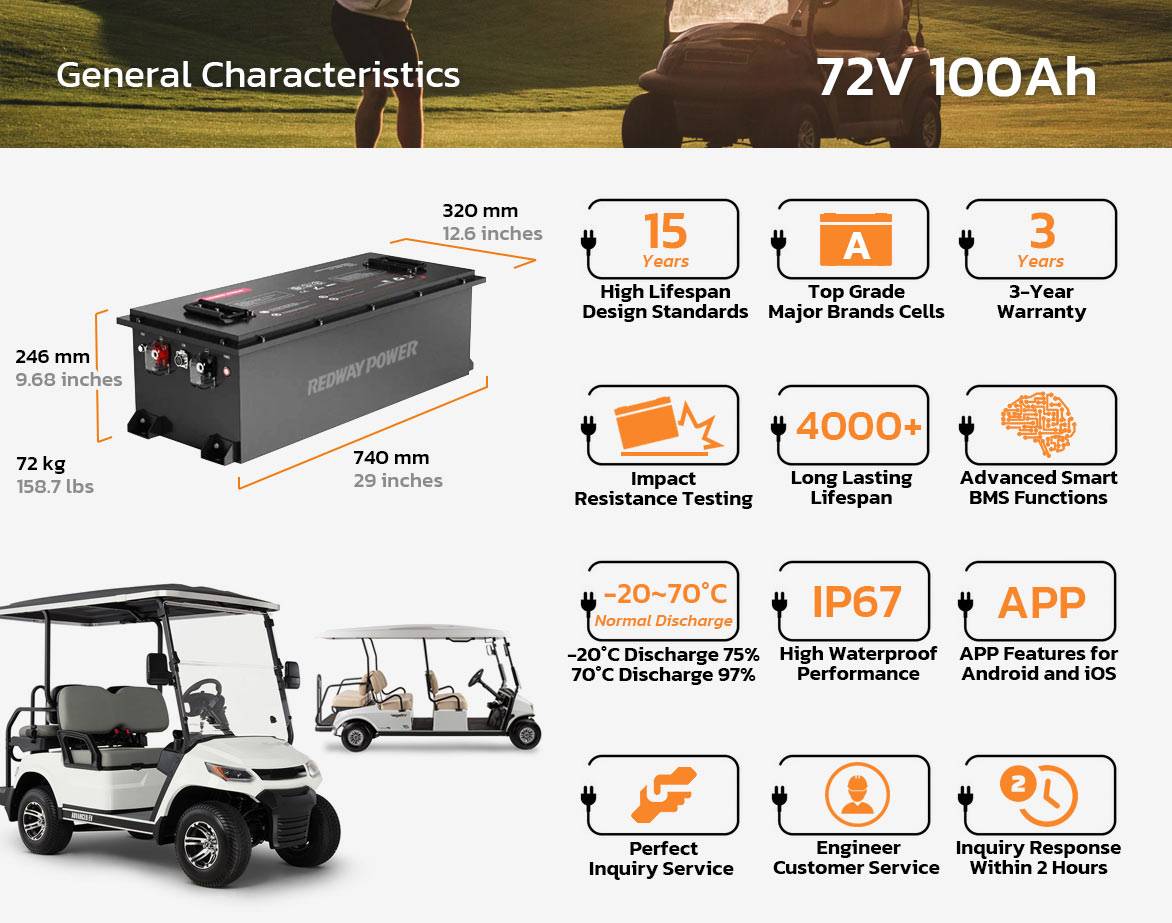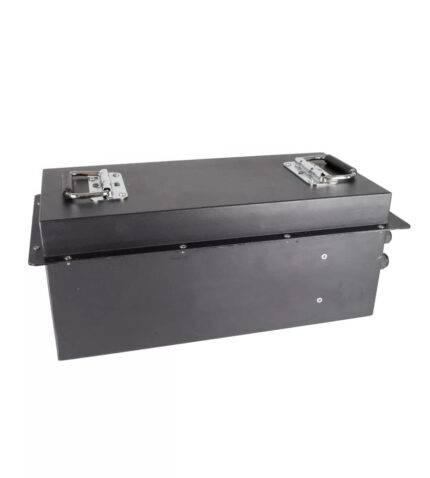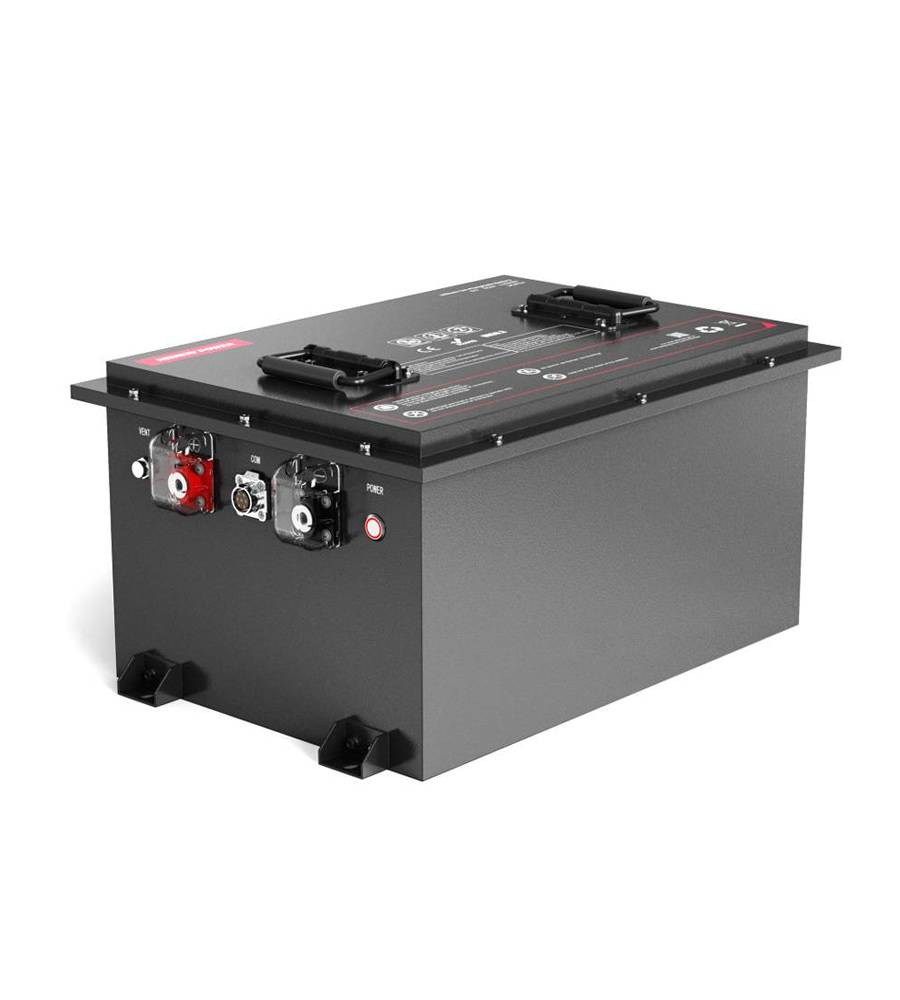- Forklift Lithium Battery
-
48V
- 48V 210Ah
- 48V 300Ah
- 48V 420Ah (949 x 349 x 569 mm)
- 48V 420Ah (950 x 421 x 450 mm)
- 48V 456Ah
- 48V 460Ah (830 x 630 x 590 mm)
- 48V 460Ah (950 x 421 x 450 mm)
- 48V 460Ah (800 x 630 x 600 mm)
- 48V 460Ah (820 x 660 x 470 mm)
- 48V 500Ah
- 48V 560Ah (810 x 630 x 600 mm)
- 48V 560Ah (950 x 592 x 450 mm)
- 48V 600Ah
- 48V 630Ah
-
48V
- Lithium Golf Cart Battery
- 12V Lithium Battery
12V 150Ah Lithium RV Battery
Bluetooth App | BCI Group 31
LiFePO4 Lithium
Discharge Temperature -20°C ~ 65°C
Fast Charger 14.6V 50A
Solar MPPT Charging - 24V Lithium Battery
- 36V Lithium Battery
- 48V Lithium Battery
-
48V LiFePO4 Battery
- 48V 50Ah
- 48V 50Ah (for Golf Carts)
- 48V 60Ah (8D)
- 48V 100Ah (8D)
- 48V 100Ah
- 48V 100Ah (Discharge 100A for Golf Carts)
- 48V 100Ah (Discharge 150A for Golf Carts)
- 48V 100Ah (Discharge 200A for Golf Carts)
- 48V 150Ah (for Golf Carts)
- 48V 160Ah (Discharge 100A for Golf Carts)
- 48V 160Ah (Discharge 160A for Golf Carts)
-
48V LiFePO4 Battery
- 60V Lithium Battery
-
60V LiFePO4 Battery
- 60V 20Ah
- 60V 30Ah
- 60V 50Ah
- 60V 50Ah (Small Size / Side Terminal)
- 60V 100Ah (for Electric Motocycle, Electric Scooter, LSV, AGV)
- 60V 100Ah (for Forklift, AGV, Electric Scooter, Sweeper)
- 60V 150Ah (E-Motocycle / E-Scooter / E-Tricycle / Tour LSV)
- 60V 200Ah (for Forklift, AGV, Electric Scooter, Sweeper)
-
60V LiFePO4 Battery
- 72V~96V Lithium Battery
- Rack-mounted Lithium Battery
- E-Bike Battery
- All-in-One Home-ESS
- Wall-mount Battery ESS
-
Home-ESS Lithium Battery PowerWall
- 24V 100Ah 2.4kWh PW24100-S PowerWall
- 48V 50Ah 2.4kWh PW4850-S PowerWall
- 48V 50Ah 2.56kWh PW5150-S PowerWall
- 48V 100Ah 5.12kWh PW51100-F PowerWall (IP65)
- 48V 100Ah 5.12kWh PW51100-S PowerWall
- 48V 100Ah 5.12kWh PW51100-H PowerWall
- 48V 200Ah 10kWh PW51200-H PowerWall
- 48V 300Ah 15kWh PW51300-H PowerWall
PowerWall 51.2V 100Ah LiFePO4 Lithium Battery
Highly popular in Asia and Eastern Europe.
CE Certification | Home-ESS -
Home-ESS Lithium Battery PowerWall
- Portable Power Stations
How to Choose Between Lithium and LiFePO4 Batteries for Golf Carts

Choosing between lithium and LiFePO4 batteries for golf carts is crucial for manufacturers looking to provide reliable, efficient, and sustainable power solutions. Both battery types offer distinct advantages, including longer lifespans and improved performance compared to traditional lead-acid options. Understanding their differences can help in making informed wholesale decisions.
What are lithium and LiFePO4 batteries, and how do they differ?
Lithium batteries encompass a range of technologies, including lithium-ion and lithium iron phosphate (LiFePO4). The primary difference lies in their chemical composition and performance characteristics:
- Lithium-ion: Known for high energy density and lightweight, they are suitable for applications requiring compact power sources.
- LiFePO4: This type offers enhanced thermal stability, safety, and longevity, making it ideal for high-demand applications like golf carts.
Chart: Comparison of Lithium vs. LiFePO4 Batteries
| Feature | Lithium-ion | LiFePO4 |
|---|---|---|
| Energy Density | Higher | Lower but adequate for most applications |
| Lifespan | 500-2000 cycles | 2000-5000 cycles |
| Safety | Moderate risk of thermal runaway | Very safe with low risk |
| Cost | Generally more expensive | Cost-effective over lifespan |
How do lithium batteries enhance the performance of golf carts?
Lithium batteries significantly improve golf cart performance through:
- Higher Efficiency: They convert a greater percentage of stored energy into usable power compared to lead-acid batteries.
- Faster Charging: Lithium batteries can recharge more quickly, reducing downtime between uses.
- Consistent Power Output: They maintain voltage levels better throughout discharge cycles, providing reliable performance.
These advantages result in enhanced speed, range, and overall user experience on the course.
What are the key benefits of using LiFePO4 batteries in golf carts?
LiFePO4 batteries offer several benefits specifically suited for golf cart applications:
- Longer Cycle Life: With a lifespan exceeding 3000 cycles, they outlast traditional lead-acid options.
- Thermal Stability: Their design minimizes risks associated with overheating, making them safer under various conditions.
- Lower Self-discharge Rate: They retain charge longer when not in use, ensuring readiness whenever needed.
These features make LiFePO4 an attractive choice for both manufacturers and end-users.
Chart: Benefits of Using LiFePO4 Batteries
| Benefit | Description |
|---|---|
| Long Cycle Life | Lasts longer than lead-acid alternatives |
| Thermal Stability | Safer under high temperatures |
| Low Self-discharge | Maintains charge during inactivity |
Why should manufacturers consider lithium over lead-acid batteries?
Manufacturers should consider lithium batteries due to their superior performance characteristics:
- Cost Efficiency Over Time: Although initial costs may be higher, lower maintenance needs and longer lifespans result in reduced overall expenses.
- Environmental Impact: Lithium technologies contribute to lower emissions and less environmental harm compared to lead-acid production and disposal.
- Market Demand: As consumers increasingly seek eco-friendly options, offering lithium-based products can enhance market competitiveness.
Switching to lithium can position manufacturers favorably in a growing market focused on sustainability.
How do safety features in LiFePO4 batteries compare to traditional options?
LiFePO4 batteries are designed with enhanced safety features that set them apart from traditional battery technologies:
- Low Risk of Fire: Unlike other lithium chemistries, LiFePO4 has a stable chemistry that minimizes fire hazards.
- Built-in Protection Circuits: Many models include Battery Management Systems (BMS) that prevent overcharging and overheating.
- Durability: They withstand harsh conditions better than lead-acid alternatives.
These safety attributes make them particularly suitable for use in environments where reliability is critical.
What specifications should be considered when choosing golf cart batteries?
When selecting golf cart batteries, consider these specifications:
- Capacity (Ah): Determines how long the battery will last on a single charge.
- Voltage Rating: Common ratings include 36V, 48V, or higher; ensure compatibility with your cart’s system.
- Cycle Life: Look for batteries that offer high cycle counts for better longevity.
- Weight: Lighter batteries improve cart handling but ensure they meet power needs.
Understanding these specifications helps manufacturers choose the right products for their customers’ needs.
What is the future outlook for lithium and LiFePO4 battery technologies in golf carts?
The future of lithium and LiFePO4 technologies looks promising as advancements continue to enhance efficiency, safety, and affordability. With increasing demand for sustainable transportation solutions across various sectors, including recreational vehicles like golf carts, manufacturers who invest in these technologies will likely see significant growth opportunities. Additionally, ongoing research into battery recycling and second-life applications will further bolster their market viability.
FAQ Section
Q1: Are lithium or LiFePO4 batteries better for all types of golf carts?
A1: Both types are suitable; however, LiFePO4 is often preferred for its safety and longevity in high-use scenarios.Q2: How much do lithium golf cart batteries typically cost?
A2: Prices vary widely based on capacity and brand but generally range from $800 to $3000 per unit.Q3: Can I replace my lead-acid battery with a lithium battery?
A3: Yes, but ensure compatibility with your cart’s electrical system before making the switch.
Industrial News
The shift towards electric-powered vehicles continues to gain traction within the golfing industry as manufacturers increasingly adopt advanced battery technologies. Recent reports indicate a surge in demand for both lithium-ion and LiFePO4 solutions due to their efficiency and environmental benefits. As more courses embrace these innovations, industry experts predict significant growth in electric golf cart sales over the next few years.
Redway Power Insights
“Investing in lithium technology is not just about improving performance; it’s about aligning with global sustainability efforts,” states an expert from Redway Power. “As we see more consumers demanding eco-friendly solutions, manufacturers must adapt by offering advanced battery options that meet these expectations while providing reliable service.”


























